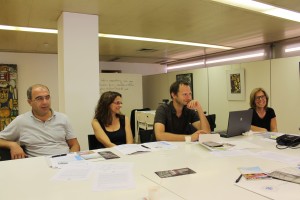Porto Grundtvig meeting, the social consequences of migration.
 During the fifth national meeting, organized by Teia Amiga – Associação, partners focused on the effect of emigration of young population on families left behind.
During the fifth national meeting, organized by Teia Amiga – Associação, partners focused on the effect of emigration of young population on families left behind.
Hosted in the beautiful setting of Fundação Cupertino de Miranda in Vila Nova de Famalicão, partners first reflected on the consequences of migration in eastern European countries where the migration flux has been more intense in the last decade, fostered by European Union inclusion. Considering the general European trend of ageing population and the increase of migration flux it is evident that exist a problem of transnational welfare that need to be faced. In this framework it is important to assess the link among migration and the social and economic status of elderly. One of the few studies that considered the topic is “Social impact of Emigration and Rural and Urban Migration in central and Eastern Europe” published by European Commission in 2012. In eastern European countries risk of poverty and social exclusion of elderly raised sharply due to low investments in social protection and welfare system (Eurostat data 2013). It is possible to underline similar patterns in the effect of migration on elder people in Eastern Europe: decrease in availability of informal caring networks and formal care services, privatization of care, low pension and difficulty in access to health system, especially in the isolated rural areas.
Remittances are commonly considered a positive aspects of migration since they improve household well-being, money transfers are used for consumption, access to health system and social assistances. In fact household not receiving remittances spend on average 18% less for health care (Migrants Health: the impact of social economical situation of migrants on their health, UNICEF-HelpAge International). Although some studies affirm that providing to families needs is one of the main reason for migrating, other studies show that the flux of transfer is mainly from adult to young and elder are mostly a net givers more than net –takers. Furthermore, grandparents plays a fundamental role in the families taking care of the children left behind, often they become legally or de facto children guardians, after years the situation is reversed and children provide care to them.
Then, Teia Amiga – Associação drew a picture of migration waves in Portugal and reflected on different role as a country of emigration and immigration. After the sharp economic crisis of 2009 migration rates increased: 90.000 people left in 2009 and nearly 110.000 in 2013. Compared to the past , the new migration wave has some peculiarity: skilled young people leaves the countries with no idea of retuning to go mainly in United Kingdom, Switzerland and Germany. Nevertheless migration is became a consistent phenomenon in Portugal, there aren’t any qualitative and quantitave studies to identified the social impact of migration on the families left behind. Only recently academics from the University of Coimbra and Lisbon starts studying the phenomenon. Nevertheless, media are bringing to the attention cases of parents left alone by migrant sons and daughters that have to face ageing without family support. Experts and psychiatrists pointed out the depression is widespread within this vulnerably group. At the moment the only private organization providing support to elderly left behind, is Fundação S. João de Deus , based in Lisbon, provides direct care to isolated elder in their daily routine through the programme Somos por si.
Project Partners met the psychologist Sandra Rocha Teixera of the Gabinete de Apoio ao Emigrante of Vila Nova de Famalicão, who explain how the office is organized and their goals. The Office, created in 2009, has the aim to assist migrants and immigrants in different field providing information on social and judicial issues, improving their skills and supporting them in the administrative proceedings. The Office, in collaboration with the Municipality of Vila Nova de Famalicão, recently started an innovative programme involving schools to map and link grandparents and grandchildren left alone and in need of care.
Finally, partners visited the Centro Nacional de Apoio al migrante, the national service to support migrants in Porto. The Center, which provides wide range of support to legal migrants, is organized in departments: social support, employment, judicial and family reunification.
The meeting fosters a deeper reflection on the transnational welfare in Europe and what seem to be an hidden topic of our society: social and economic imbalances produced by migration on the most vulnerable group.

